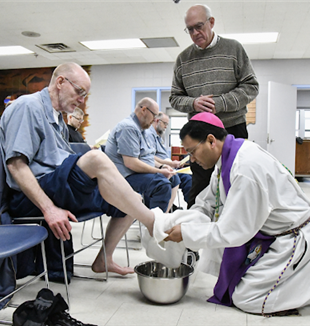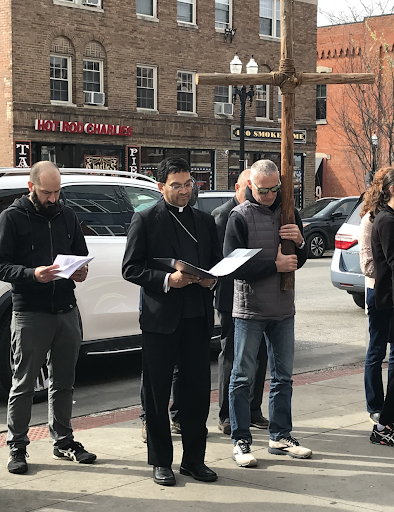
Christ Sets Us Free
“The gaze of love can be transformative. It is Christ who breaks the prison bars and sets us free.” Bishop Earl of Columbus reflects on the Resurrection in light of his recent experience.The Easter Vigil Liturgy begins with the singing of the Exsultet, which contains these words: “Be glad, let earth be glad, as glory floods her, ablaze with light from her eternal King, let all corners of the earth be glad, knowing an end to gloom and darkness.”
The contrast of Easter joy with what the whole world has experienced these past years - with the pandemic, the war in Ukraine, and the economic crisis - could not be greater, and yet amid the darkness, we are reminded that “Christ is the one Morning Star, who never sets…who, coming back from death’s domain, has shed his peaceful light on humanity…”.
Quite often we are closed in our certainties - our theological, scientific, and technological certainties. Collectively, we build an illusory world in which we, like our first parents, want to be like gods, thinking of ourselves as masters of this world. We are shocked by a more realistic scenario: man is weak and fragile; he can discover his greatness and strength only in love.
This love, however, first came from Another. The Father sent His only Son into the world to save man, who was too weak and powerless to save himself. The damage done by our first parents would be undone by the One who was true God and true man. The Exsultet continues: “O love, O charity beyond all telling, to ransom a slave you gave away your Son! O truly necessary sin of Adam, destroyed completely by the Death of Christ! O happy fault that earned so great a Redeemer!”
If our pride led to the spread of sin, so too through His humility, Christ offered us the medicine of mercy as a remedy. His victory over the powers of death “dispels wickedness, washes faults away, restores innocence to the fallen and joy to mourners.” He brings joy to mourners! As a new Bishop, this belief was put to the test, losing my mother four months after my consecration, yet the Mystery of the Resurrection also gives me hope that I shall see my parents again in the Resurrection of the flesh. His victory helps us look forward in hope towards our destiny – sharing in the life of the Trinity eternally.
The Exsultet speaks of the night of Christ’s descent among the dead and His glorious victory in these words: “This is the night, when Christ broke the prison bars of death and rose victorious from the underworld.” If at times we doubt that the Lord can turn our sadness to joy, I can share that my faith was strengthened these past two weeks. Three weeks ago, I went to a prison in Madison County, Ohio, and offered two Masses. Rather than bitterness and resentment, I saw hope in the eyes of the men who were incarcerated. They are not prisoners, but men – flesh and blood – like you and me. I also experienced hearts full of gratitude and gazes from men, who, with a look of love, recognized their own worth in the presence of Christ the Good Shepherd.
Last week, at the Pontifical College Josephinum, a group of prison chaplains from the Diocese gathered along with State Director Annette Chambers-Smith, Director of the Ohio Department of Rehabilitation and Corrections, and Michael Davis, Director of Recreation and Spiritual Services, to watch the film Unguarded, which was directed and produced by Simonetta d'Italia Wiener and who was accompanied by Alberto De Simoni, who is the Program Manager for the Restorative Freedom Initiative.
At times, we can allow our sins to define us. We can even allow others to define us by our sins, our crimes, our failings, both civil and moral. We can think of ourselves as prisoners rather than persons. Director Chambers was moved to tears by the film, which showed persons, who, with a gaze of love, were transformed. She saw in the film a reflection of what she is trying to do with rehabilitative services in Ohio, but this demands conversion, not only of incarcerated persons, but of those who “guard them”, who have been conditioned to judge rather than see another’s humanity.
On Holy Thursday, I returned to the prison to wash the feet of those who are detained there. Time and again, Christ bends down to wash our feet to make us fit for his service. He left us an example, because we are no longer slaves but His friends. It is by washing feet from this posture of lowliness and service that I can gaze upward toward another person with love and affirm that he has value, that he is loveable, and that he is loved by God and by me.
It was necessary to break free from patterns of harsh judgment on those who had injured society by their actions and to appreciate their humanity. It is precisely Christ, who rather than judge us severely for our failings, gazes upon us with love – the way He gazed upon Peter after His threefold denial. The gaze of love can be transformative. It is Christ who breaks the prison bars and sets us free.
Christ comes to save us from sin and death. He offers us freedom and life! We are not prisoners; we are children of God! The “necessary sin of Adam was destroyed completely by the Death of Christ”! Our God is the God of Life and He never abandons us. He is Risen! He is truly Risen! Alleluia!
Most Reverend Earl K. Fernandes, Bishop of Columbus